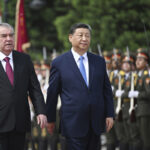A consortium including Chinese battery giant CATL has beaten off rivals from Russia and the United States to win the right to help Bolivia develop its largely untapped reserves of lithium.
The deal, announced at an event in the political capital La Paz, would see the CBC consortium partner on direct lithium extraction from the country’s Uyuni and Oruro salt flats.
The partnership would give CBC, which also includes mining giant CMOC, rights to develop two lithium plants, which could each produce annually up to 25,000 tonnes of battery-grade lithium carbonate.
The agreement could help finally unlock Bolivia’s huge potential as a supplier of lithium for batteries needed to power the global shift to electric vehicle, although projects to mine the ultralight metal take many years and doubts remain around the direct extraction technology being used.
Bolivia’s iconic salt flats are home to the world’s largest lithium resources at 21 million tonnes, according to the US Geological Survey, but the country has almost no industrial production or commercially viable reserves.
Bolivian President Luis Arce said CBC would invest over $1 billion in the project’s first stage, boosting infrastructure, roads and conditions needed to start up plants the country hopes will one day produce lithium cathodes and batteries.
He added that talks were ongoing for potential partnerships with other foreign firms. The companies who have remained in the race include US firm Lilac Solutions, Russia’s Uranium One Group and three other Chinese bidders.
Lithium Triangle of Bolivia, Argentina, Chile
CATL is the world’s largest EV battery manufacturer but does not currently produce any lithium, although it has invested in a number of Chinese projects. It lost a bid in 2021 to buy out Argentina-focused Millennial Lithium Corp.
Bolivia, together with Argentina and Chile, sits atop the so-called “lithium triangle” which contains more than half the world’s resources of the metal.
“Today begins the era of industrialisation of Bolivian lithium,” Arce said, adding that there was “no time to lose” in developing the metal. The price of battery-grade lithium reached close to $85,000 a tonne toward the end of 2022.
Energy minister Franklin Molina said the move showed there were “sovereign alternatives to the privatisation models of lithium exploitation.” Bolivia state firm YLB is set supervise and take a central role in the project.
Source : Asia Financial
















